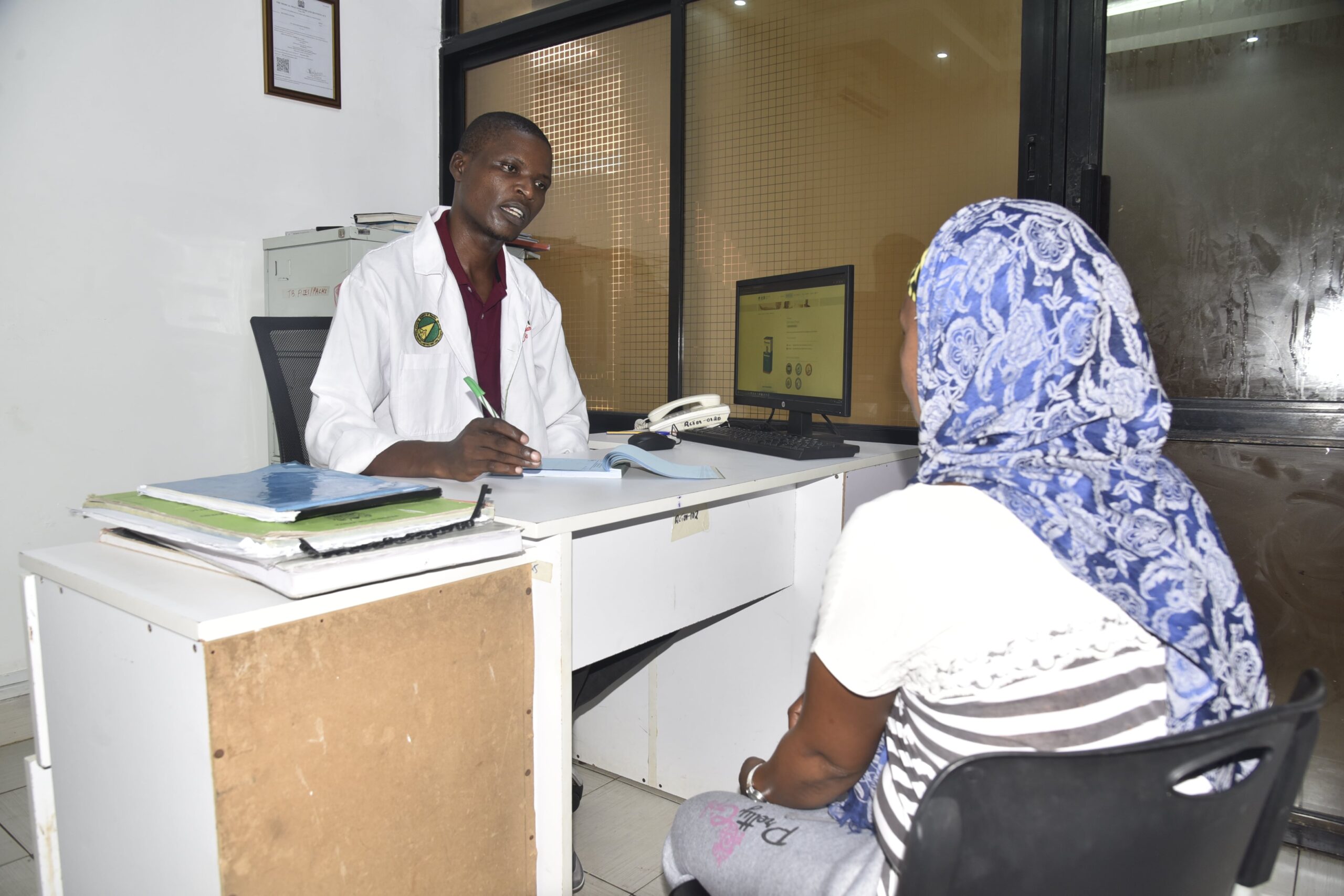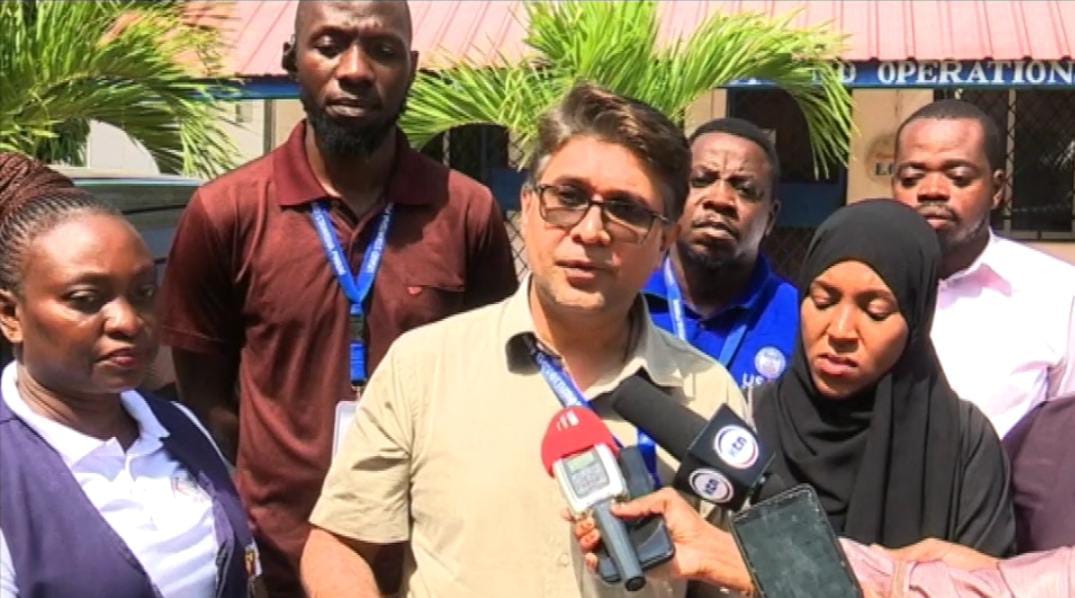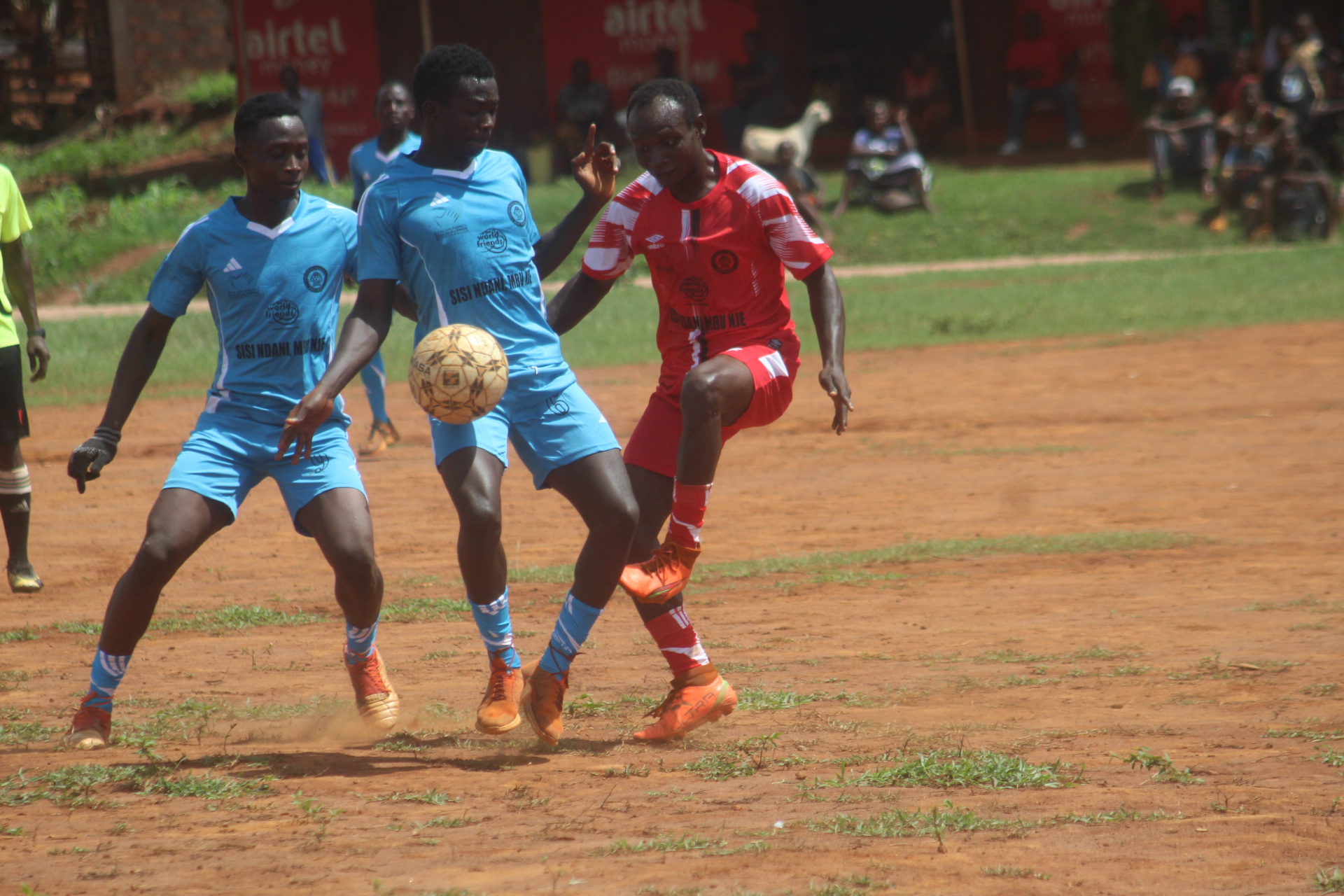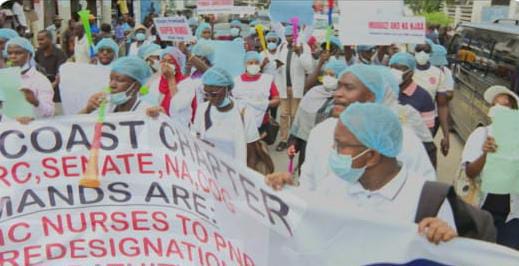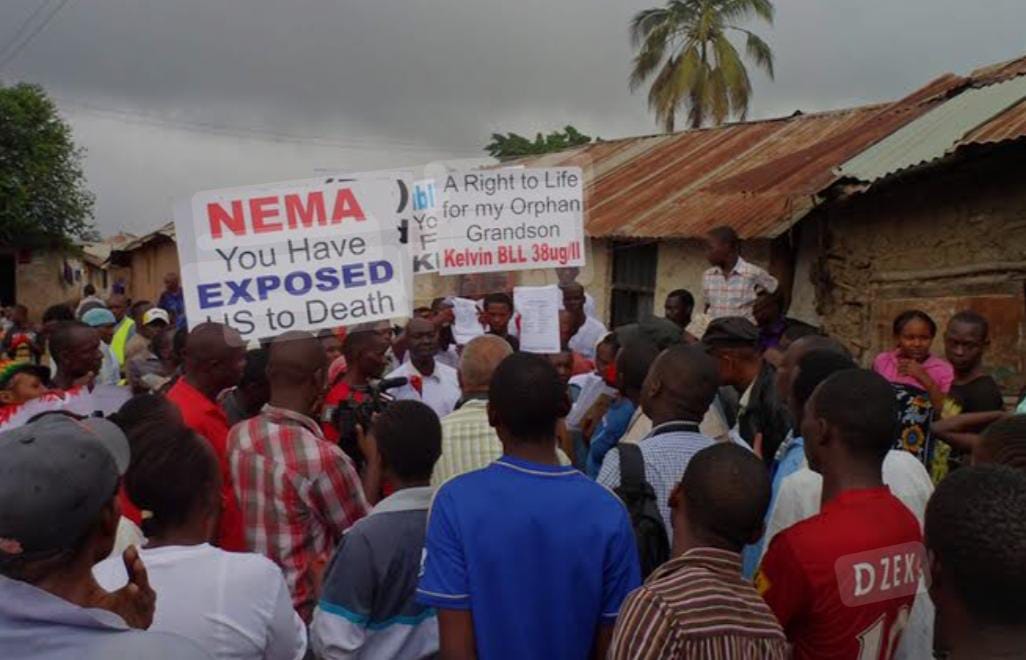Dr. Daniel Juma, the resident doctor at Reachout Clinic, is attending to a patient who has come for her monthly check-up. Photo Credit Reachout Center Trust.
Lilian Lele, a 38-year-old mother of one residing in Likoni, Mombasa City, has triumphed over her heroin addiction, thanks to efforts by Reachout Center Trust.
Now in recovery, she dedicates her time as a peer educator at Reachout Centre in Mombasa.
Lele and her twin sister were raised by her grandmother after their mother was raped and killed in the Mathare Slums, Nairobi Metropolitan. Her father had also passed away.
While she lived with her grandmother, women in the neighborhood encouraged the grandmother and her cousin’s mother to send the girls to an approved school. This was to prevent them from experiencing the same ordeal that Lilian’s mother faced, as the girls started exhibiting mischievous behaviors.
“After my mother died, I had to live with my grandmother with my twin sister and small brother. The neighbors told my grandmother to take us to an approved school. Since my grandmother wanted me to have an education, she heeded their words and took me with Njoki, my cousin, who is now deceased, to Kirigiti Girls Approved School in Kiambu County in 1997,” says Lillian.
Lilian began her education on a high note, even being selected as the head girl. However, she soon became overwhelmed by peer pressure, leading to her unexpected decision to escape from school.
“At the school, a newcomer named Elizabeth Mwikali, who is also deceased, incited us to escape. So during dinner time, we escaped by jumping over the fence and running,” she narrated.
Lilian and her two other friends would later find themselves at the Nairobi bus station, where they started their lives as street children.
“One day, when asking for help on the streets, I accidentally bumped into our principal. I sprinted with every ounce of energy I had and told my friends; we were afraid thinking that he was looking for us; it’s at that point that we went to the Railway station and hid inside the train to Mombasa” she said.
Lilian’s journey took a significant turn in 1998 when she moved from Nairobi to Mombasa. Initially placed in a children’s home in Mombasa by a good Samaritan, she eventually fled and ended up living on the streets of Mombasa. It was there that she was introduced to heroin, turning to drug injection as a means to cope with her circumstances.
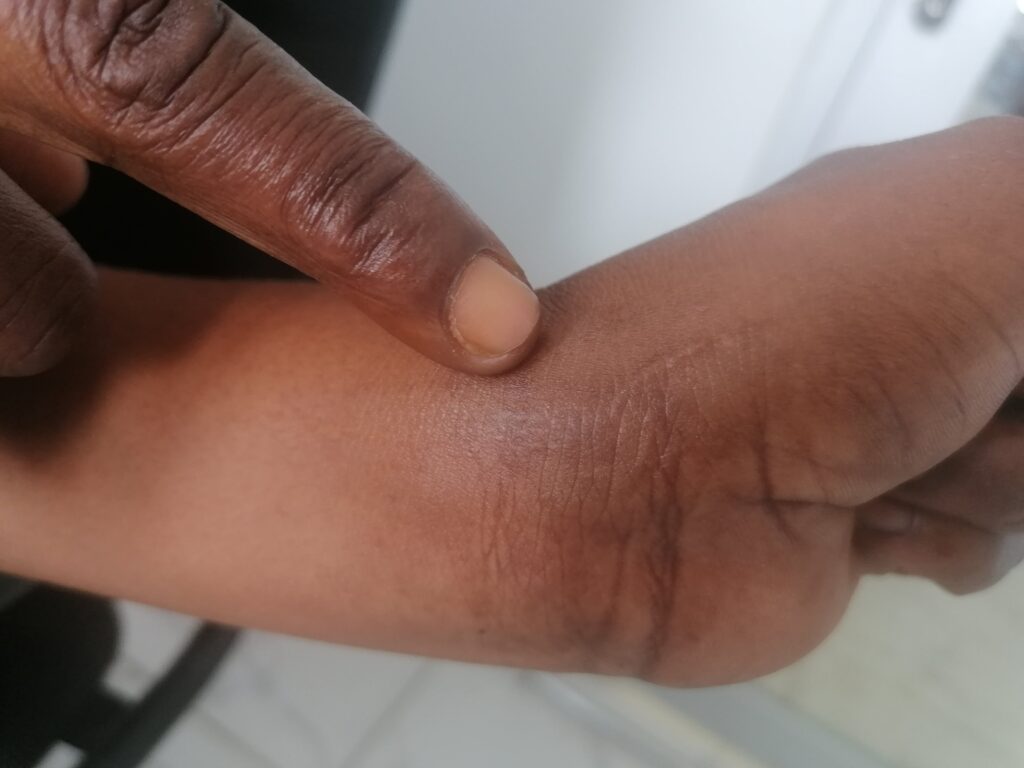
Lilian Lele shows some of the scars left on her hand from injecting drugs. Photo credit, Ruth Keah.
At 20, Lilian found out she was pregnant. Fortunately, she found support through the Tuonane project, an initiative by Reachout Centre Trust, and was blessed with twins, a girl and a boy.
The Tuonane project is an initiative by Reachout Centre Trust, a non-profit organization dedicated to providing preventive and treatment services for individuals with substance use disorders and HIV/AIDS in the Coastal region of Kenya.
This initiative focuses on utilizing a mobile service approach to deliver health care services, including reproductive health services, to drug addicts in “Maeneo’’ the local term referring to the spot where drug addicts gather to use.
The field officers from Reachout Centre Trust used to visit all the “Maeneo” in Mombasa and look for women drug addicts who were pregnant and enroll them in the program. The visit would be done twice a month.
The project also coordinated with healthcare providers at Mwembe Tayari municipal clinic near the “maeneo” and also the Coast General Hospital to ensure access to delivery services.
During their monthly visits, the field officers also took the women to the hospitals to familiarize them with their surroundings and health care providers. And during delivery, sometimes they accompany them. During the program implementation, more than 200 pregnant drug addicts benefited from the services.
“Luckily, under the Tuonane project, I received prenatal care services every month; from the time I was pregnant until delivery, I was visited six times,” Lilian shared.
“They monitored the position of the babies and conducted HIV tests. Thankfully, I tested negative. One morning, I found myself wet, not knowing that that was a sign that I was ready to deliver. I asked my friends for help to take me to the Coast General Hospital where I had earlier been introduced by the Trust.
“On 3rd November 2008, I was very high on drugs while pregnant, I had taken heroin, I started feeling some pain and experienced some wetness. I asked one of my friends to take me to Coast General Hospital, and they received me very well, and booked me to the theatre where I gave birth to healthy twins, each weighing 3 kilograms,” she said.
Lilian says the drugs she had taken had effects on her to the point that she was not responding to anaesthesia drugs.
“The doctors were wondering why I was not getting dizzy. After I told them what I was using, they increased the dose, and I eventually slept. However, by the time the second baby was taken out I was already awake”, she narrated.
Unfortunately, one of the twins, the girl, passed away at just four months due to pneumonia.
“We used to sleep on the floor, using empty cartons as mattresses. At night, we would sometimes walk to the beach with my kids. I believe the cold weather took its toll on her. By the time I took her to the hospital, it was already too late, and she passed away,” she concluded.
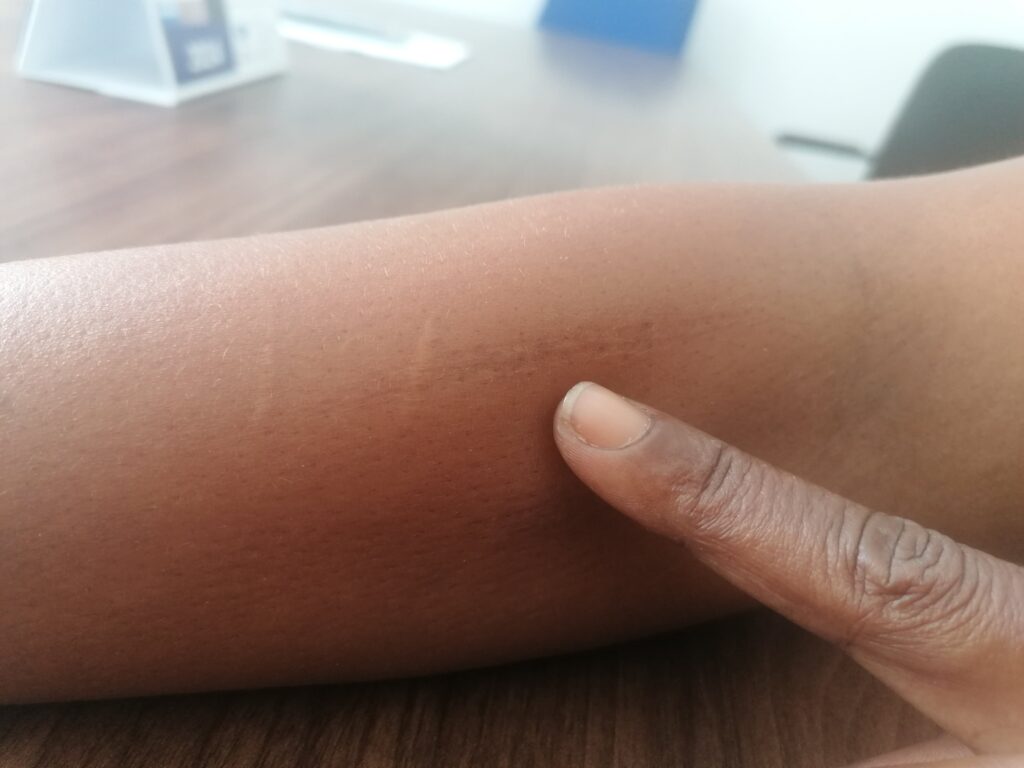
Lilian Lele shows some of the scars left from injecting drugs. Photo Credit, Ruth Keah.
STIGMA
Fatuma’s (not her real name) case differed from Lilian’s. The 31-year-old mother of three from Bombolulu, Mombasa, works as a volunteer at Reachout Centre as she continues her journey toward recovery from drug addiction.
Dressed in a brown animal print dera, I met her at the counseling offices of Reachout Centre Trust, located at the heart of Mombasa City, exchanging ideas with her friends. Fatuma began using drugs at the tender age of 13, starting with heroin injections. She believes that the environment of her upbringing played a significant role in her decision to use drugs.
“The landlord of the house where I used to live with my mother had been involved in selling drugs. After my mother passed away, I moved back into the house. Soon after, my friends introduced me to drug use,” she explained.
With her family turning a blind eye to her struggles, Fatuma felt neglected and eventually moved out. It was during this period that she met her husband. Both of them were caught in the cycle of addiction, meeting at “Maeneo,”.
At only 14 years old, Fatuma became pregnant for the first time. However, she never sought prenatal care, fearing the stigma that most drug addicts face while seeking medical services. This pattern continued with her second pregnancy. Unaware of the risks that her drug use posed to both herself and her unborn children, she did not prioritize attending prenatal clinics.
“Using drugs occupied my mind, leaving little room for thoughts of seeking medical care. Additionally, societal stigma and the unfriendly environment of healthcare settings discouraged me from seeking medical help,” she said.
A study conducted by the National Authority for the Campaign against Alcohol and Drug Abuse (NACADA) between September 1, 2022, and December 1, 2022, reveals that 57.3% of drug users are women, while 42.7% are men.
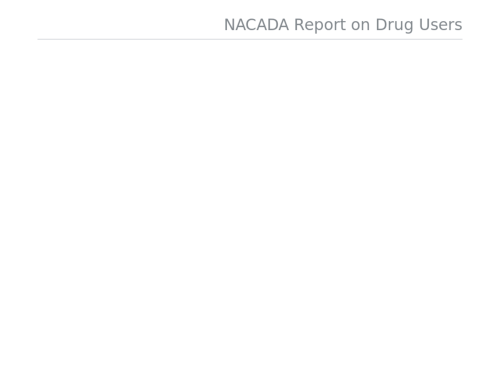
According to a Joint report by the Regional Commissioner’s Office and NACADA – Coast Region, the prevalence of any substance abuse, alcohol, khat, and tobacco in the Coast Region is higher than the National rate. With the region largely affected by hard drugs like heroin, bhang and mugukaa, especially counties of Mombasa, Kwale, Kilifi and Lamu.
Coast region had the highest prevalence of multiple drug use (10.5%), followed by Nairobi (8.4%) and Central (7.8%).
The report further states the types of drugs available in the market have increased over time while channels of communication and distribution have expanded, giving drug merchants an ever-increased access to a wider market, especially on the Kenyan Coast.
Due to its coastal location, Mombasa is also known to be a major drug trafficking route for countries across the world. The scale of trafficking means a range of highly addictive drugs are readily available throughout the city.
The situation is especially alarming for pregnant women, who encounter stigma and lack of knowledge regarding access to prenatal care services. These services are crucial to ensure the health of both the mother and the baby.
In Kenya, adequate prenatal care entails a minimum of four antenatal visits during which expectant mothers receive medical check-ups, ultrasound scans, guidance, nutritional advice, vaccinations, blood pressure monitoring, and screenings for conditions such as HIV and malaria. This plays a vital role in the early detection and management of potential complications, significantly reducing the risk of maternal and infant mortality and promoting a healthy pregnancy.
According to Taib Abdulrahman, the Executive Director at Reachout Centre Trust, women who are drug addicts face numerous challenges, including stigma and discrimination within society. They often encounter obstacles in accessing specialized services such as seeing gynecologists and physicians, making it difficult to receive the necessary support to progress.
“Drug addicts, like any other women, need a safe space to express themselves freely, but unfortunately, they lack that opportunity. Recognizing this need, we felt compelled to establish a clinic with comprehensive services,” he explained.
He further emphasized the importance of ensuring pregnant women with substance use disorders receive comprehensive antenatal and postnatal care.
Abdulrahman acknowledged the additional challenges faced by pregnant addicts, including the desire for abortions upon realizing their pregnancy and instances of gender-based violence. Consequently, the center offers psychosocial support to help them accept their situation and embark on the prenatal care process.
“We strive to provide end-to-end support, ensuring these women receive the care they need throughout their pregnancy journey,” he concluded.
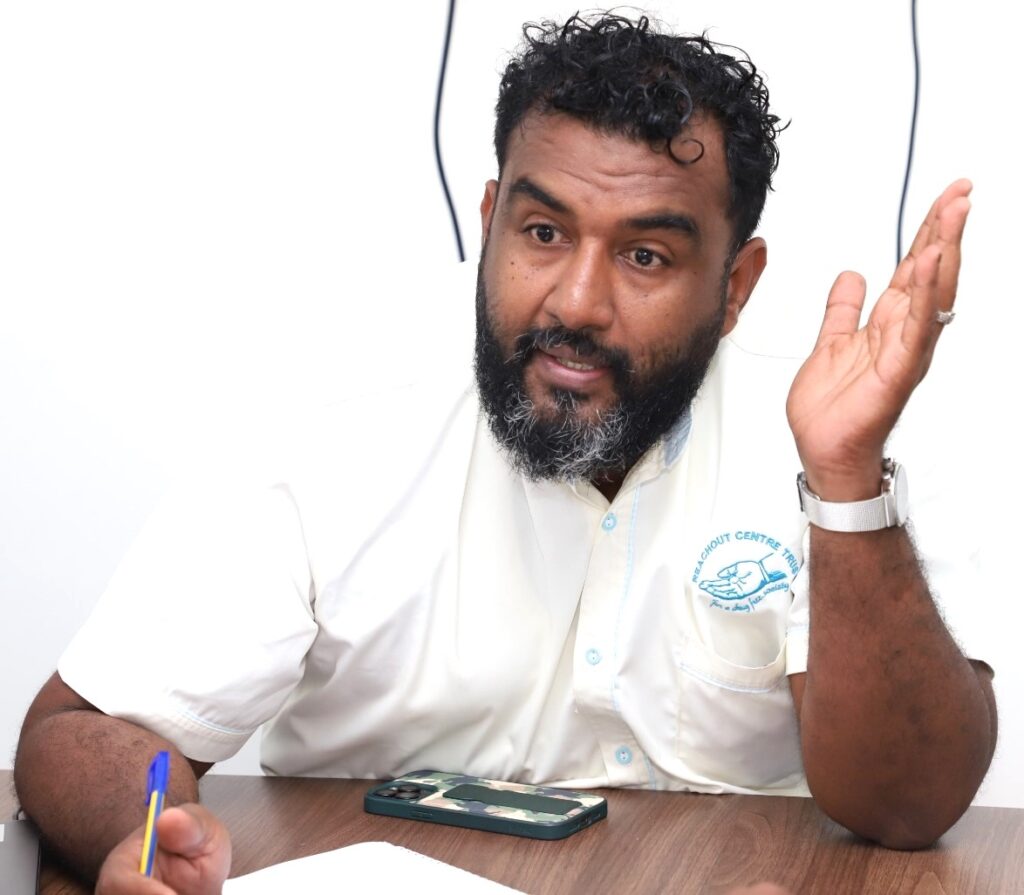
Taib Abdulrahman, Executive Director at Reachout Centre Trust. Photo Credit, Reachout Center Trust.
Bridging gaps in prenatal care access for pregnant drug addicts
Following the successful implementation of the Tuonane Project in 2005 where they provided healthcare services, including prenatal care, to drug addicts on the streets, the Trust established a permanent, fully equipped clinic at its headquarters in Mombasa in 2015.
This move aimed to make it easier for addicts to access reproductive health services. The center supports 3,500 drug users, with over 200 females who have so far received prenatal healthcare services in Mombasa County since they started the clinic.
The clinic has a dedicated team of nurses and clinicians who offer various services, including daycare, HIV testing, hepatitis screening, and mental health support. Specifically, for women, they address needs such as sexually transmitted diseases, cervical cancer screenings, tuberculosis medication, and reproductive health services, such as family planning.
According to Dr. Daniel Juma, the resident doctor at Reachout Clinic, they have prioritized accessibility and friendliness in delivering healthcare services to addicts. He acknowledges the common fears among drug-addicted women regarding childbirth in hospitals, fearing separation from their children and stigmatization.
“It is important to accompany the women from conception, empowering them to navigate pregnancy with confidence, and ensuring family integration, our clinic operates full-time from Monday to Friday, half-day on Saturdays, and on-call on Sundays”, he said.
“After walking with the women from pregnancy to delivery to family integration, we continue to monitor them and ensure the baby receives all the vaccines needed”, he added.
He said prenatal services offered at the clinic include psycho-social counseling, HIV testing, antiretroviral therapy (ART) care, Family planning, and nutritional support.
While the clinic does not offer delivery services, it connects the women with identified healthcare facilities in Mombasa County for delivery, discouraging home births.
“We normally encourage early clinic attendance, preferably starting at three months of pregnancy. We also conduct continuous awareness campaigns with public healthcare facilities to ensure inclusive treatment when we refer them for delivery,” he said.
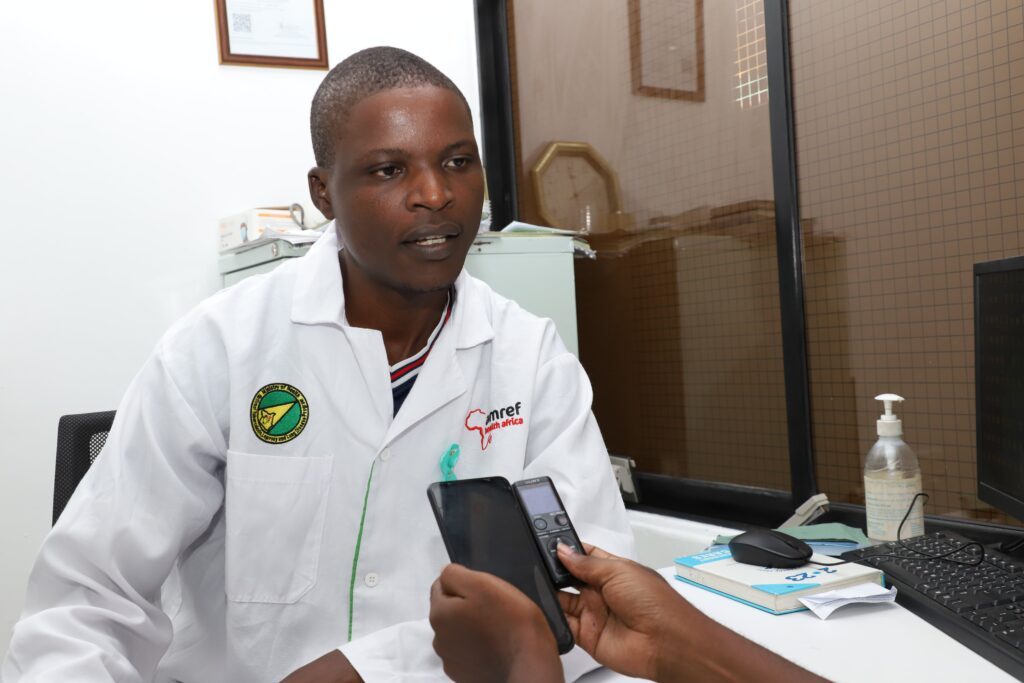
Dr. Daniel Juma, the resident doctor at Reachout Clinic during the interview. Photo Credit, Reachout Center Trust.
Fatuma found herself among the lucky ones as she became part of the organization’s harm reduction program and started receiving methadone treatment. Methadone treatment is a medicine used to treat heroin dependence. It is taken daily to relieve heroin withdrawal symptoms and reduce cravings for heroin. Data from the NIDA-funded Maternal Opioid Treatment: Human Experimental Research study shows methadone has been explored as a way to reduce fetal exposure to withdrawal periods.
Harm reduction refers to policies, programs, and practices designed to reduce the negative health, social, and legal impacts and harmful effects related to drug use, drug policies, and drug laws.
During her treatment, Fatuma unexpectedly became pregnant with her third child. Thankfully, she received prenatal care through the Reachout Center Trust clinic.
“I attended approximately six prenatal clinics and received various services, including counseling and monitoring of my blood pressure levels. This journey was relatively smooth for me. Nine months later, I delivered a healthy baby weighing over 2kg, compared to my first two children, who weighed slightly less than 2kg,” she said.
Rachel Mwangi, 32, a mother of two, also benefited from the prenatal care services. After relocating from the countryside to Mombasa to look for greener pastures, Rachel fell into heroin addiction after being introduced to it by friends. She struggled with this addiction for five years and during this period, she became pregnant with her first child.
“Reachout Center visited the Godown-Shimanzi area where I lived and talked to us about the risks of drug use during pregnancy. They emphasized the importance of attending all prenatal checkups,” Rachel recounted.
With tears rolling freely down her cheeks, Rachel highlighted the challenges she faced while accessing hospital services amidst addiction struggles; including transportation, stigma, and the urge to spend money on drugs. However, Reachout provided transportation and facilitated her access to their clinic’s services.
Rachel remembers the happenings of that Monday morning when her labour pains checked in. She had gone through all the preparations with the field officers, so she was well prepared for delivery.
Armed with a blue hospital bag containing two pairs of Leso, a baby shawl, three pairs of baby clothes, and two pairs of socks, Rachel, with the help of her friends from “Maeneo, ” escorted her to the Reachout Centre clinic. After observation, they took her to the hospital, where she safely delivered her bouncing baby boy.
“I was escorted to Coast General Hospital when I went into labor. The reception was warm because Reachout accompanied me. Without them, I doubt I would have received the same level of care, as health providers often don’t treat addicts like regular patients,” she said.
Rachel’s second pregnancy was smoother, as she was now familiar with the process and had unhindered access to prenatal care at the Reachout Center clinic until delivery.
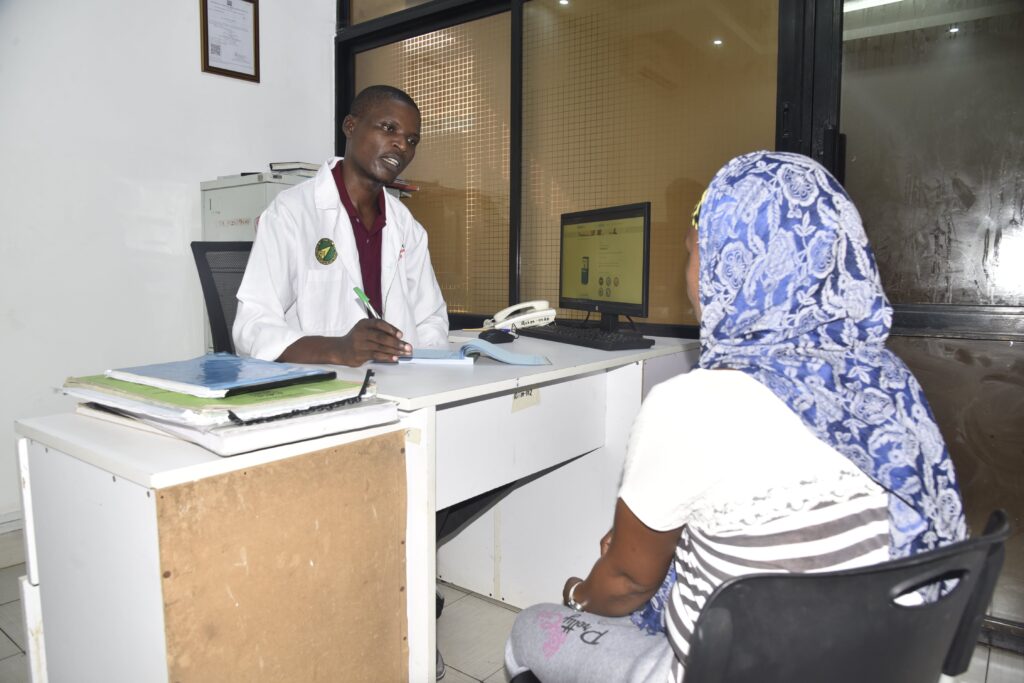
Dr. Daniel Juma, the resident doctor at Reachout Clinic, is attending to a patient who has come for her monthly check-up. Photo Credit, Reachout Center Trust.
Understanding the Risks
According to the U.S. Centres for Disease Control and Prevention (CDC), individuals with substance use disorders, particularly those who inject drugs, face a higher risk of acquiring HIV. This increased vulnerability is attributed to sharing needles, syringes, or other injecting equipment that may be contaminated with the virus.
Research shows that the use of tobacco, alcohol, or illicit drugs or misuse of prescription drugs by pregnant women can have severe health consequences for infants. The 2022 Kenya Demographic Health Survey reports states that in Mombasa, an estimated 6% of people who inject drugs are living with HIV.
According to Dr Juma, there are many risks posed to both mother and baby if the mother has HIV. Pregnancy can weaken the immune system, potentially accelerating the progression of HIV in the mother, and babies are at increased risk of mortality if the virus is not stopped from passing on to them using antiretroviral drugs during pregnancy and childbirth.
Additionally, Dr. Juma highlighted the risks of using drugs while pregnant.
“Substances like bang can increase the risk of miscarriage, while cocaine use can result in low birth weight, often below 1.8 kilograms, and may lead to underdeveloped digestive systems in newborns”, he said.
Other risks include preterm labor, birth defects, stillbirth, withdrawal symptoms in the baby after birth, a higher risk of sudden infant death syndrome (SIDS), poor fetal growth rate, and cognitive and behavioral problems.
“Most hard drugs can pass through the placenta to the fetus in the womb. This means that the child can receive a dose of the drug to some extent. If the child is born and proper management is not provided, there is a high likelihood of complications, including withdrawal symptoms, which could even result in the loss of the child,” explained Dr. Juma.
According to a study by NACADA, among female drug users, 45.6% reside in rural areas, whereas 54.4% are urban dwellers. Furthermore, 54.9% of these women are married, 8.7% are divorced, and 5.5% are widowed.
Dr. Samuel Ngugi, a gynecologist from the Aga Khan Hospital in Mombasa, said the consumption of illicit drugs or misuse of prescription drugs by expectant mothers can lead to severe health risks for their infants.
“This is because many substances can easily pass through the placenta, thus affecting the fetus, approximately five percent of pregnant women use one or more addictive substances”, he said.
He said the nature and intensity of withdrawal symptoms in infants are influenced by the type of drug used, the duration and frequency of the mother’s usage, how her body metabolizes the drug, and whether the infant was born prematurely or at full term.
“Consistent use of certain substances may result in birth defects, premature births, low birth weight babies, small head circumference at birth and associated neuro-developmental problems, sudden infant death syndrome, and neonatal abstinence syndrome,” he said.
Dr. Ngugi emphasized the importance of raising awareness, particularly among women, especially those who use drugs, about the risks involved and the necessity of abstaining from drug use during pregnancy.
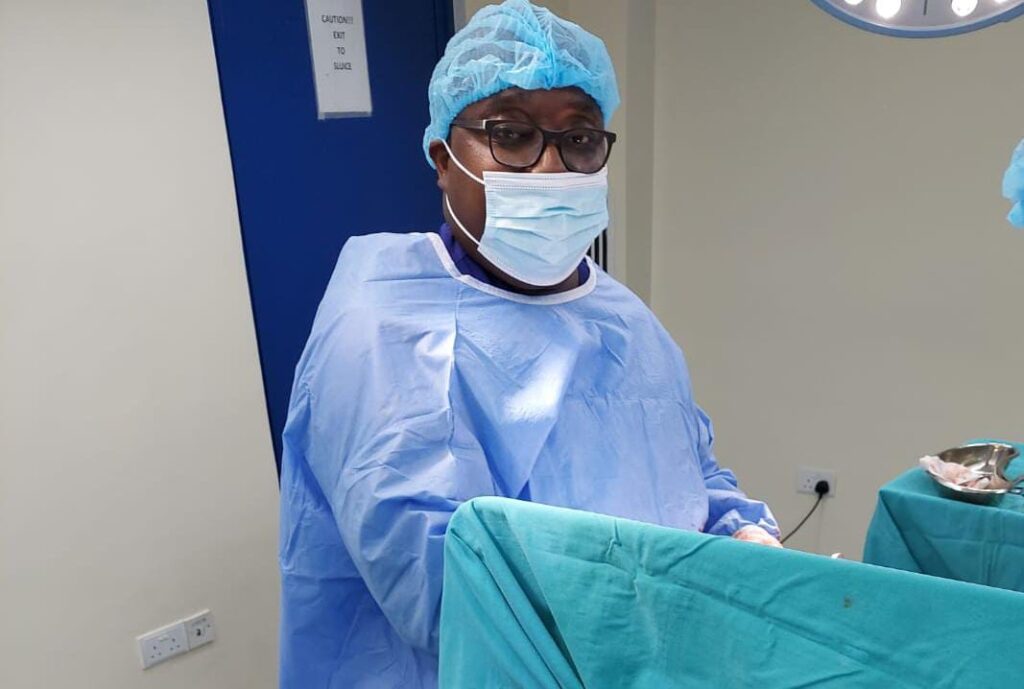
Dr. Samuel Ngugi, A Gynecologist at Aga Khan Hospital In Mombasa. Photo Credit, Dr. Samuel Ngugi.
Challenges.
The County government of Mombasa has played a pivotal role in supporting the center with policy direction, training, and capacity-building initiatives. Abdulrahman also acknowledged the crucial support from the national government and other stakeholders in the fight against drug abuse.
He said financial assistance from development partners and contributions from the local business community in Mombasa have been instrumental in sustaining operations.
“Despite these partnerships, running such centers remains costly, with monthly pharmaceutical expenses ranging from Ksh 100,000 to Ksh 200,000”, he said.
“Also managing pregnant women actively using drugs is a big challenge, dealing with individuals in rehabilitation is comparatively simpler, as we can provide comprehensive services while they stay with us”, he added.
Dr. Juma highlighted several challenges faced by the center: unrealistic expectations from beneficiaries seeking financial support, shortages of pharmaceutical supplies, and difficulties with family reintegration. Many family members are unwilling to accept beneficiaries back due to concerns about continued drug use and theft.
“Acceptance of the mothers by their families after safe delivery remains a hurdle in providing holistic support to recovering addicts, ” he concluded.
With Teens Watch Rehabilitation Centre in Kwale County providing such health services to the key population, Abdulrahman emphasized the necessity of developing comprehensive policies aimed specifically at women drug addicts.
He believes this would facilitate their access to Universal Health Coverage and the Social Health Insurance Fund, thereby fully integrating them into the citizenship framework Kenya is striving to build.
Abdulrahman called for collaboration among stakeholders, including county governments, to open more hospitals capable of providing pregnant drug addict women with complete services, from treatment to delivery, without necessitating referrals to other healthcare institutions.
“We have recently inaugurated another facility in Likoni, where patients receive treatment before returning home. However, our ultimate goal is to establish a facility that can cater specifically to women who are addicts and pregnant, offering antenatal and delivery services on-site,” he concluded.

